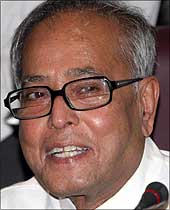 A high-level BJP delegation met finance minister Pranab Mukherjee on Tuesday to protest against the proposed Direct Tax Code, which it claimed would adversely impact the small and middle income group and discourage savings, social security and capital formation.
A high-level BJP delegation met finance minister Pranab Mukherjee on Tuesday to protest against the proposed Direct Tax Code, which it claimed would adversely impact the small and middle income group and discourage savings, social security and capital formation.
The delegation, comprising leader of Opposition in Lok Sabha Sushma Swaraj, her counterpart in Rajya Sabha Arun Jaitley and others, said Mukherjee had assured them that DTC was only at the drafting stage and discussions were still on.
The finance minister said he would not do anything (on DTC) for a year. . .till 2011-12," Swaraj claimed.
The BJP leaders gave their observations about DTC to Mukherjee and also put forward their demands on the issue.
"Our basic objection to the Direct Tax Code is that it increases the tax liability of the small and middle income group. . .
It also discourages savings which goes against the ethos of the middle class," Jaitley said.
"Another very disturbing and disquieting feature in the Code is the rather thinly veiled attempt to destroy the charitable and religious institutions playing a stellar role in promoting education, health and other social welfare activities," the BJP said, opposing the ground shift in taxing them as "a Machiavellian first step towards reckless commercialisation of education and health, for which these institutions are perceived to be road blocks."
Pressing for continuing current exemption to religious trusts, the party opposed exemption limited to only those trusts or institutions that are registered with government under the religious endowment acts and denying tax deduction to donors of such bodies. A large number of trusts that are not registered under these acts will have to apply for registration which may or may not be granted and may be used as a backhand move to seize control of these institutions, the party leaders asserted.
The party also expressed shock at the code seeking to force TDS (tax deduction at source) from every citizen whose income is below taxable limit, be he a cobbler, rickshaw-wala, street vendor or a senior citizen and anyone having savings in post offices and banks. It will be an ordeal for the 'am admi' (common man) to claim refunds from the department by filing returns.
Pointing out adverse impact on small and middle income taxpayers, the party said the code paints a picture of lower taxes for all, but the devil lies in the detail as they will end up paying more because of withdrawal of tax incentives to savings and withdrawal of the fringe benefit tax.
Seeking changes in the tax structure to ensure the small and middle income groups are not adversely hit, the party sought the minimum exemption limit raised to Rs 300,000 and that for women and senior citizens up to Rs 350,000 and Rs 400,000 respectively. It also demanded that valuation of perquisites rationalised by dropping the proposal to tax leave travel concession and leave salary and levying no tax on reimbursement of expenses.
As regards implications for government employees, it said "the code suffers from the mindset 'one size fits all' by proposing valuation of perquisites such as housing, conveyance etc at market rates. Present taxation norms for government employees need not be disturbed, it stressed.
They stressed on not discontinuing incentives to taxpayers to own a house or invest in house property to maintain a sustained fillip to the housing sector and rather enlarge the scope for even smaller players to invest in housing projects. Incentive to individuals to build apartments on a single plot of land larger than a certain size will unlock the vast untapped potential of individual investors in this sector, they urged.
Their memorandum also urged Mukherjee to desist from taxing pension, savings in provident fund and life insurance policies to let individuals build their own safety net as the state does not have one unlike the western countries that they need in the twilight of life.
Turning to small and medium entrepreneurs, the memorandum says the presumptive tax of 8 per cent on turnover on businesses having turnover up to Rs 1 crore (Rs 10 million) is excessive and need revised to a lower rate by taking a more realistic view. The code exempts them from maintaining regular books of accounts, but they will be compelled to maintain them to justify their turnover is actually below Rs 1 crore.
The memorandum also wanted the provision declaring any receipt or payment of loan or deposit exceeding Rs 20,000 as income unless paid by draft or account payee cheque revised to Rs 50,000 as the threshold of Rs 20,000 fixed in 1989 was not realistic after two decades. It said the proposed procedure to compute business income is also cumbersome and harrowing for small businesses.
It wonders how small traders will be able to comply with the code requiring them to maintain vouchers and receipts of items of over Rs 50. They are supposed to keep carbon copies or counterfoils of serial numbers of receipt containing name and address of the buyer purchasing any edible or non-edible items costing more than Rs 50 a kilo like pakoras, dosas, idli, vegetables and dals.
Other issues raised in the memorandum include:
No taxing of financial transactions and continuing capital gains tax as also lower tax on long term gains as against short term ones as they help individuals plan for their social security by investing savings in these assets and gaining long term appreciation.
Special incentives to women and senior citizens.
MAT (minimum alternate tax) of 2 per cent on gross assets base is very detrimental, especially for those engaged in infrastructure sector like power generation, roads, airports and ports construction.
NRIs (Non-Resident Indians) who are exempted from taxation are sought to be denied minimum exemption limit of Rs 160,000 and the new flat rates of taxes have prompted many whether they have now become "non-required Indians) as henceforth their interest and investment income would be taxed at 20 per cent, capital gains at 30 per cent and
residual income at a whopping 35 per cent.
Exemptions to cooperative sector should not be diluted in any manner while the code seeks to exempt only primary agricultural cooperatives and not even agricultural produce marketing committees and boards.
News agencies enjoying exemption from taxation should not be taxed as it goes against the Constitution providing guaranteed freedom of speech.
Universities, educational institutions and hospitals should be allowed to continue exemptions instead of taxing them as they do contribute immensely to the socio-economic development in the country.
The memorandum also faulted the abnormal and extraordinary powers given to the tax authorities by way of General Anti Avoidance Rules (GAAR), reopening of assessments to harass taxpayers, no relief by way of stay of demand made by IT officers, deemed notice even if not served, seizure of stock-in-trade instead of current law permitting on
inventorisation and no seizure, and harsh penalty and prosecution provisions.
Image: Pranab Mukherjee







 © 2025 Rediff.com -
© 2025 Rediff.com -